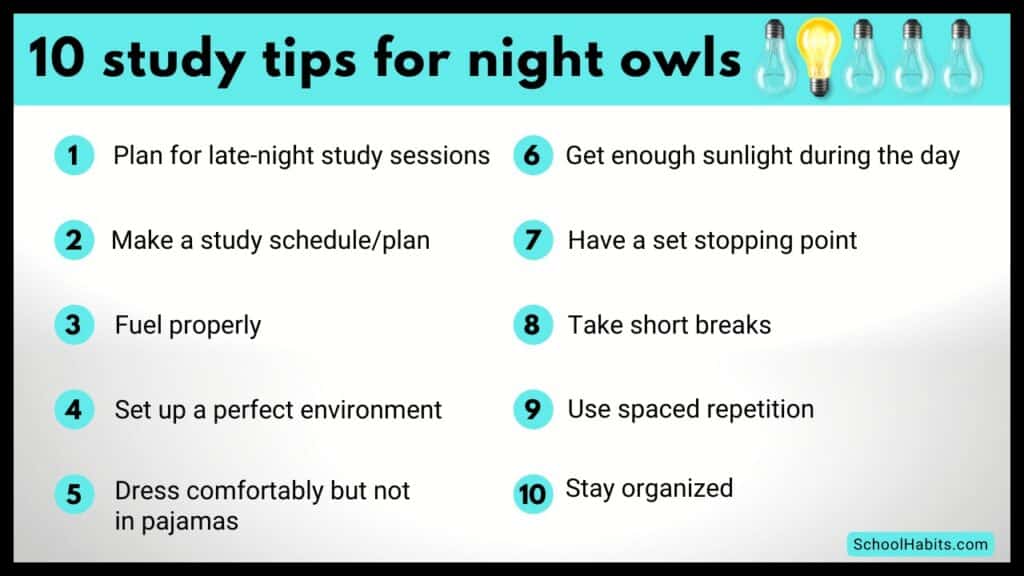By Katie Azevedo, M.Ed.
This blog post offers study tips for night owls. It is intended for students in high school, college, and above.
If you prefer to watch the video form of this post, I’ve posted that below.
Wake up at 5 AM! Meditate for 20 minutes! Drink a kale smoothie! And then hit the books by 6 AM!
If that sounds absolutely awful to you, don’t do it. A lot of common and generic study advice suggests students wake up at the crack of dawn to be the most productive. But that advice does not work for everybody.
What is a night owl?
Some students are what we call “night owls” – feeling more energetic and focused during the evening hours and more sluggish and unfocused in the morning.
Night owls tend to wake up late in the morning and go to bed later at night. Some studies, like this one, suggest that genetics and circadian rhythms contribute to the likelihood that someone is a night owl.
We all have different sleep cycles and routines, so being a night owl is perfectly normal within certain limits. If you get a hit of energy from 9 PM through 1 AM, you might be a night owl, in which case the study tips in this blog post are for you.
Disadvantages of being a night owl student
Being a night owl as a high school student can be challenging, as most high schools begin class between 7 AM and 8 AM. Many night owls are chronically late to morning high school classes, which can seriously impact grades and relationships. College students have more flexibility to design their course schedule around their sleeping preferences, but extreme night owl-ism can still be problematic for older students.
While I am sharing study tips for night owls, I am not recommending that students adopt a late-night study routine. Additionally, I strongly advise against all-nighter study sessions because they are never worth losing a good night’s sleep. (If you absolutely must pull an all-nighter study session, do it this way.)
10 study tips for night owls
If you are really a night owl and you’ve tried to adjust your sleep-wake cycle with no success, then use the following study tips to maximize your nighttime sessions.
1. Plan for late-night study sessions.
True night owls wake up late and go to bed late on a consistent basis. Therefore, late-night study sessions are to be expected, and should not be a consequence of poor planning and procrastination. If you know your optimal energy hours are between 9 PM and 1 AM, mark that time in your calendar just as someone would who chooses to study between 5 PM and 9 PM. Be intentional and deliberate about guarding your study time, even if it’s when most people are sleeping.
2. Make a study schedule/plan.
Before you begin any study session, no matter if it’s at 11 in the morning or 11 at night, you have to have a plan. WHAT will you be studying? For HOW LONG? Do you have the materials? What active recall methods will you be using? Use my free study planner to figure this part out.
3. Fuel properly.
Our hormones are different at night than they are during the day. So are our metabolism, hunger, digestion, and all the body systems. This means that your body might crave more sugar at night time, in order to provide enough energy to stay awake. Do not rely on sugar or caffeine to fuel your late-night study sessions: excess sugar and caffeine can devastate your natural body rhythms and sleeping patterns. Instead, eat adequately during the day and consider cutting all caffeine consumption after 3 or 4 PM. Your best bet for fueling late study sessions is lots of water, and real food if you’re hungry. You know the difference between real food and junk.
4. Set up a perfect environment.
When you study at night, you’re up against a few odds, including limited lighting and limited available and open spaces. This means you need to pay extra attention to the environment you study in, starting with lighting. While warm dim lights may be relaxing, they may be too relaxing and promote zoning out or falling asleep. Instead, opt for brighter lights that are neutral or cool-toned.
Next, avoid studying in your bed. Let me rephrase that: NEVER study in your bed. If space is limited, set up a cheap card table or collapsable desk in your room that you can take down during the day. If you have the space, set up your study session at a desk, kitchen table, or another flat surface that allows you to sit in a normal chair – not a fluffy chair. Your study space should promote alertness, not relaxation.

5. Dress comfortably but not in pajamas.
Fight the urge to wear your pajamas while studying. Sure, wear something loose and comfortable, but avoid wearing pajamas because they are a trigger for sleep.
6. Get enough sunlight during the day.
Natural sunlight regulates our circadian rhythms and sleep/wake cycles. If you don’t get enough natural sunlight during the day, you can have trouble falling asleep at night and staying awake during the day. If you know you’ll be up late studying, be intentional about exposing yourself to at least 30 minutes of sunlight throughout the day.
7. Have a set stopping point.
Never begin a study session without knowing what time it will end. If you follow my advice for planning your study sessions, setting a shutdown time won’t be hard. In general, I don’t recommend studying for more than two hours total, and that’s including multiple breaks. So if you begin your study session at 10 PM, your shutdown time should be no later than midnight.
8. Take short breaks.
Daytime and nighttime study sessions should include short breaks. It doesn’t matter if you have the energy to keep going – the point is that it’s better for the learning process to take breaks.
Experiment with different work-break intervals to see what you prefer. Two common ratios are:
- 25 minutes work: 5 minutes break (classic Pomodoro Technique)
- 45 minutes work: 15 minutes break
9. Use spaced repetition.
Spaced repetition is essential for learning information thoroughly enough so that you actually remember it. I explain everything you need to know about spaced repetition right here (definitely read that post). Whether you regularly study at noon or at midnight, you need to start the study process early enough so that you can use spaced repetition over a period of at least a few days. Want to know if you’re studying correctly? Here are 5 signs you’re studying wrong and what to do instead.
10. Stay organized.
Nighttime hours are precious because the later you stay up studying, the less time you’ll have available for sleeping. To get the most out of your late-night study sessions, get and stay organized during the day. If you’re organized, you can spend every available minute actually studying, instead of searching for your materials. Here are some organization tips:
- Keep your class notes neat and organized
- Create cheat sheets throughout each unit
- Always date and title your notes
- Keep digital notes named and filed appropriately
- Stay on top of your class readings
- Prepare study materials before your study sessions
- 7 more note organization tips
Final notes about study tips for night owls
Tip: The night before your exam, do these 8 things.
It’s worth repeating that while these study tips for night owls can help you maximize your late-night study sessions, I still strongly suggest that you try everything possible to adjust your sleeping habits to align with more traditional hours. College students are the ones most likely to get away with being true night owls, but high schoolers and working professionals will encounter significant challenges. Most adult jobs will not accommodate irregular sleep/wake patterns, and the sooner you can adjust your sleeping habits, the better off you’ll be. If you are debating an all-nighter because you have too many things on your to-do list and not enough time, consider these two more realistic options instead.
*If you have difficulty falling asleep despite a healthy bedtime, or if you suffer from insomnia or other sleep irregularities, please consult a medical professional, because I am not a physician.


